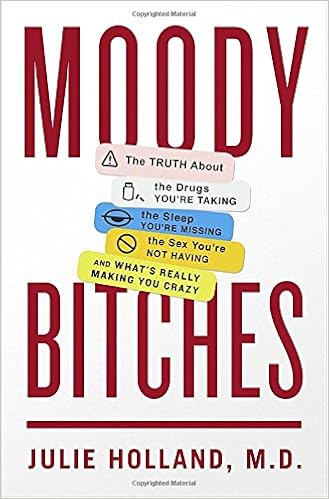The full title is Moody bitches : the truth about the drugs you're taking, the sleep you're missing, the sex you're not having, and what's really making you crazy (not capitalized because I copied it from a library catalog).
I only read the chapter on perimenopause, not because the whole book didn't seem useful and appealing but because I don't have 300 potentially demoralizing nonfiction pages in me right now.
The book is written by a psychiatrist, not much older than me, but living a different life because she's a parent. I appreciate that she can and does share what's going on with her--hello, belly fat!--despite being an almighty MD.
Holland writes about her daughter beginning her menstrual life as Holland is exiting hers. "Both of us are having fits and starts of our ovaries, but only one of us gets a pass on her pimples and emotional outbursts. Puberty gets an allowance. Perimenopause gets bupkis." Amen, sister!
She provides facts and statistics like a Gallup poll reporting that women are their happiest and most fulfilled from the ages of 50-65. At the moment, that seems impossible, but a girl can dream. And less fun tidbits like, "three-quarters of women between forty-five and fifty-four have some episdoes of urinary incontinence." Remember up above where I wrote "potentially demoralizing"?
Hot flashes--80% of women. Insomnia lasting for years. Night sweats. Weight gain. "Climacteric psychosis." "PMS for the big girls" is when you have a period without ovulating, so the follicular phase lasts for a whole cycle. FUCK.
Holland lays the goodies out for you but also offers some suggestions, like advising you to get "your free thyroid hormone levels tested, not just your TSH."
Often, one of the first symptoms of perimenopause, before the hot flashes, before the disrupted sleep, is depression. Your risk of depression nearly triples in the perimenopausal transition.
With what Holland says about depression accompanying perimenopause I'm having a climacteric psychosis that professionals I've seen about my anxiety and depression haven't brought it up with me.
People freaked out twenty years ago over a survey about synthetic hormone use, and doctors are still reeling from it, but that doesn't mean that bioidentical hormones have to be bad. It turns out hormones can be good for you and are even correlated with lower incidents of Alzheimer's. If hormones scare you, Holland also recommends weed!
In perimenopause, as women's fertility wanes, so does our desire or willingness to take care of other people (could explain my constant rage at the state of my apartment because a certain person doesn't pick up after himself).
When estrogen levels fall, we start to slowly transition from the self-sacrifice of "Okay, sweetie, I'll just take care of this" to a more assertive "Do it yourself, why don't you?"
Or maybe it's just my climacteric psychosis talking. The main thing is talking. There's so much secrecy and shame around menopause and aging, primarily for women that there isn't as much talking as there should be. I started a Facebook group for that purpose. What are you doing? What are you feeling? Who do you want to kill? Yourself, sometimes? Me, too.
